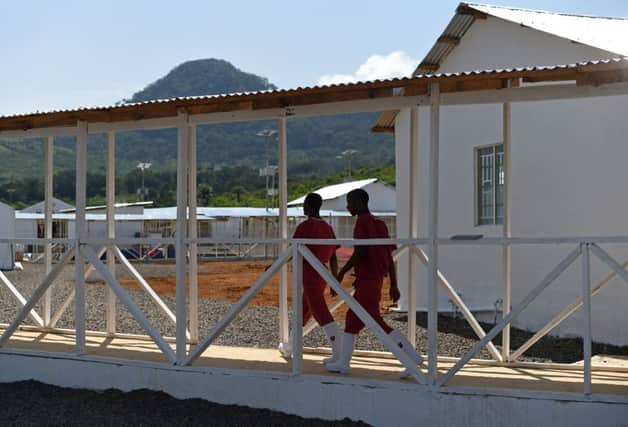Brit flown back to UK after exposure to Ebola


The unnamed medic has not been diagnosed with the virus but was admitted to the specialist centre at London’s Royal Free Hospital for assessment and is being kept in isolation as a precaution. No details have been released about the health worker, who was treating an Ebola patient when they were pierced by a needle.
It is believed that the medic would have been working at the Kerry Town treatment centre and that the injury would have happened within the last 48 hours. This is the period when someone who has had a known exposure to Ebola would have had a window of opportunity to be safely transported to the UK as they are not yet contagious.
FOLLOW US
SCOTSMAN TABLET AND MOBILE APPS
Advertisement
Hide AdAdvertisement
Hide AdIt is believed the military transport arrived at RAF Brize Norton in Oxfordshire in the early hours of yesterday morning.
A statement from the Royal Free Hospital said: “We can confirm that a UK military healthcare worker has been admitted to the Royal Free Hospital following a needlestick injury while treating a person with Ebola in Sierra Leone.
“The individual has been admitted to the Royal Free Hospital for assessment. The individual is likely to have been exposed to the Ebola virus but has not been diagnosed with Ebola and does not have symptoms.”
Needlestick injuries involve a piercing of the skin, typically by a needle point but also by other sharp instruments or objects. They are a serious occupational hazard for doctors, healthcare workers and those working in law enforcement. The injuries are of particular concern because of the risk of blood-borne diseases being transmitted.
The Kerry Town complex includes an 80-bed treatment centre managed by Save the Children and a 12-bed centre staffed by British Army medics specifically for health care workers and international staff responding to the Ebola crisis. Pauline Cafferkey, the Scottish nurse who recently recovered after contracting Ebola, worked there from November.
Another British nurse who was successfully treated for Ebola, William Pooley, had been volunteering at the Kenema Government Hospital, also in Sierra Leone.
About 100 soldiers from the Royal Army Medical Corps were sent to the country in October as part of the British Government’s £330 million effort to stop the spread of the virus.
Public Health England (PHE) said the patient is likely to have been exposed to the Ebola virus but has not been diagnosed and does not have symptoms.
Advertisement
Hide AdAdvertisement
Hide AdProfessor Paul Cosford, PHE’s director for health protection, said: “Our thoughts are with this person, who has been courageous in helping those affected in West Africa, and in preventing the wider spread of Ebola.
“We have strict, well-tested protocols in place for this eventuality and we are confident that all appropriate actions have been taken to support the healthcare worker concerned and to protect the health of other people.”
The patient will be monitored for the remainder of Ebola’s 21-day incubation period, in line with PHE’s standard procedures.
There is one known case of a British person contracting Ebola in a needlestick accident. In November 1976, after the virus first emerged, Geoffrey Platt accidentally pricked his finger while taking a sample from an infected guinea pig while conducting research at Porton Down military research centre in Wiltshire.
The laboratory technician made a full recovery.